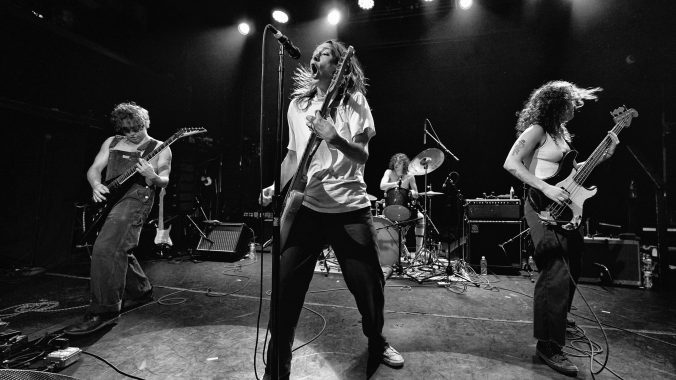The Music Industry Doesn’t Know What to Do With The Bobby Lees
Hollywood A-lister Jason Momoa believes in the punk band from Woodstock. So, why can’t they afford to keep making music?
Photo by Dutch Doscher
In repose within the bowels of the Bowery Ballroom sit the Bobby Lees, the Woodstock-bred punk band composed of vocalist and guitarist Sam Quartin, bassist Kendall Wind, drummer Macky Bowman and guitarist Nick Casa. Their set will soon begin, and sounds of their casual chit-chat can be heard from around every corner of the place. By now, one would think pre-show rituals would be well underway. Instead, they’re keen to keep talking—and not just about the gluten-free doughnuts someone thought to bring. For New Yorkers, this is just another Wednesday—the last before the Christmas holiday. For the Bobby Lees, it could very well be the last time they play this venue. There’s a lot to say.
One month earlier, the Bobby Lees shared a sobering announcement via the band’s Instagram account: They had come to the conclusion that, after years of making music, touring and promoting (both largely on their own), they had no choice but to take a hiatus—one that’s potentially indefinite. The yeses had far surpassed the nos and the industry, it seemed, didn’t know quite what to do with the band—even despite sold out shows, and an impressive fan base that spans from upstate New York to the Hollywood Hills.
The news arrived as a shock not just to those that love them, but peers (Amy Helm, Dead Tooth, Amanda Palmer etc.), too. How could a band that’s been working steadily since 2018—three records and multiple tours, to be exact—find themselves at an impasse? According to the post: Streaming’s varied effects on the industry had made sustaining a band an economic impossibility. “It’s wild most people are comfortable spending three to five bucks on a cup of coffee today, but they no longer want to spend that same amount on an album they listen to—often because streaming has set a shitty standard most of us have accepted,” their caption read. “Bands our size barely make anything from Spotify payouts. Worse off, they’ve made algorithms and streaming numbers become more important than how something makes you feel.”
In truth, the decision to step away, they told me before their last show, is actually due to a collection of internal crises. Unbeknownst to their supporters, that post had been a long time coming for the Bobby Lees. Without the backing of a big label, they’ve paid for all three albums and mapped out every tour on their own. For all intents and purposes, they’ve done everything artists can to succeed—working alongside producers who’ve elevated Chris Stapleton and Jack White, creating a critically-acclaimed discography, selling out domestic and international shows, and making fans out of even the most surprising of people, Keanu Reeves and Juliette Lewis, to name a few. Even still, they’re not breaking even and in fact, have been hemorrhaging money.
“To everybody it seems like a blind side because on Instagram and social media everything looks so amazing all the time,” Casa says. “The reality isn’t shown. So, to all our fans and all the people around us, they’re like, ‘this doesn’t make sense. You guys are doing so well.’” “After doing three albums and paying for them ourselves, we’re just kind of like, ‘really? there’s not one label that will give us a record?’” Quartin adds of the band’s most persistent thought.
-

-

-

-

-

-

-

-

-

-

-

-

-

-

-

-

-

-

-

-

-

-

-

-

-

-

-

-

-

-

-

-

-

-

-

-

-

-

-

-








































